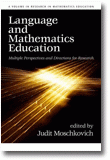
Language and Mathematics Education
Multiple Perspectives and Directions for Research
Edited by:
Judit N. Moschkovich, University of California at Santa Cruz
A volume in the series: Research in Mathematics Education. Editor(s): Denisse R Thompson, University of South Florida. Mary Ann Huntley, Cornell University. Christine Suurtamm, University of Ottawa.
Published 2010
Issues of language in mathematics learning and teaching are important for both practical and theoretical reasons. Addressing issues of language is crucial for improving mathematics learning and teaching for students who are bilingual, multilingual, or learning English. These issues are also relevant to theory: studies that make language visible provide a complex perspective of the role of language in reasoning and learning mathematics. What is the relevant knowledge base to consider when designing research studies that address issues of language in the learning and teaching of mathematics? What scholarly literature is relevant and can contribute to research? In order to address issues of language in mathematics education, researchers need to use theoretical perspectives that integrate current views of mathematics learning and teaching with current views on language, discourse, bilingualism, and second language acquisition. This volume contributes to the development of such integrated approaches to research on language issues in mathematics education by describing theoretical perspectives for framing the study of language issues and methodological issues to consider when designing research studies. The volume provides interdisciplinary reviews of the research literature from four very different perspectives: mathematics education (Moschkovich), Cultural-Historical-Activity Theory (Gutiérrez, Sengupta-Irving, & Dieckmann), systemic functional linguistics (Schleppegrell), and assessment (Solano-Flores). This volume offers graduate students and researchers new to the study of language in mathematics education an introduction to resources for conceptualizing, framing, and designing research studies. For those already involved in examining language issues, the volume provides useful and critical reviews of the literature as well as recommendations for moving forward in designing research. Lastly, the volume provides a basis for dialogue across multiple research communities engaged in collaborative work to address these pressing issues.
CONTENTS
Foreword, David Pimm. Preface, Judit N. Moschkovich. 1 Language(s) and Learning Mathematics: Resources, Challenges, and Issues for Research., Judit N. Moschkovich. 2 Developing a Mathematical Vision: Mathematics as a Discursive and Embodied Practice, Kris D. Gutiérrez, Tesha Sengupta-Irving, and Jack Dieckmann. 3 Language in Mathematics Teaching and Learning: A Research Review, Mary J. Schleppegrell. 4 Function and Form in Research on Language and Mathematics Education, Guillermo Solano-Flores. 5 Recommendations for Research on Language and Mathematics Education, Judit N. Moschkovich. Afterword, Beth Warren. Contributors.
REVIEWS
"Considering the growing importance of discursive research, LME is a timely contribution to the library of mathematics education research. It is an invaluable resource for both outsiders wishing to get acquainted with the field and for insiders who feel the need to take stock of what there is out there, so as to also plan for the future. The interdisciplinary character of the picture collaboratively painted by leading specialists of their respective fields is an important asset of this collection. By relating discursive research in mathematics education to other areas of human sciences, this book provides the reader with an understanding of where this research is coming from and where it is likely to lead. Above all, it shows that a discursive approach may have a chance to bridge between the seemingly irreconcilable requirements of insightfulness and usefulness, on the one hand, and trustworthiness and rigor, on the other. This book reads as a declaration of the new hope, and it substantiates its optimism by showing how the expectations that many were likely to dismiss as “but dreams†are gradually becoming reality." Anna Sfard in Educational Studies in Mathematics
-
Paperback978-1-61735-159-4
Web price: $45.04 (Reg. 52.99)
-
Hardcover978-1-61735-160-0
Web price: $80.74 (Reg. 94.99)
- eBook9781617351617

- EDU037000 - EDUCATION: Research
- MAT027000 - MATHEMATICS: Research
- MAT030000 - MATHEMATICS: Study & Teaching
-
 A Five-Year Study of the First Edition of the Core-Plus Mathematics Curriculum
A Five-Year Study of the First Edition of the Core-Plus Mathematics Curriculum
-
 Approaches to Studying the Enacted Mathematics Curriculum
Approaches to Studying the Enacted Mathematics Curriculum
-
 Digital Curricula in School Mathematics
Digital Curricula in School Mathematics
-
 International Perspectives on Mathematics Curriculum
International Perspectives on Mathematics Curriculum
-
 International Perspectives on Mathematics Teacher Education
International Perspectives on Mathematics Teacher Education
-
 Researching Pedagogy and Practice with Canadian Mathematics Teachers
Researching Pedagogy and Practice with Canadian Mathematics Teachers
-
 Variability is the Rule
A Companion Analysis of K-8 State Mathematics Standards
Variability is the Rule
A Companion Analysis of K-8 State Mathematics Standards

